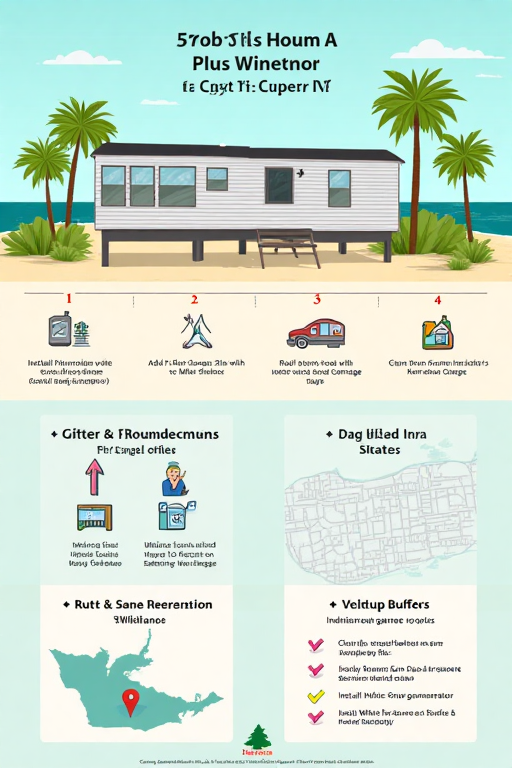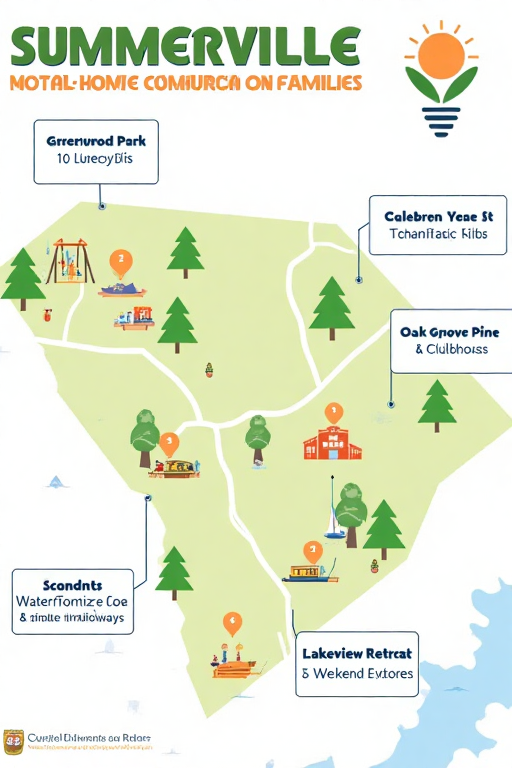A Beginner’s Guide to Mobile Home Flipping in South Carolina
Your Comprehensive Investment Guide from Faith Mobile Home Solutions
Introduction
Welcome to our beginner’s guide to mobile home flipping in South Carolina. In recent years, mobile home flipping has emerged as a popular and profitable investment strategy. With a lower barrier to entry than traditional real estate investments, mobile homes offer attractive opportunities for those looking to renovate and resell properties at a profit.
This comprehensive guide is designed for beginners and seasoned investors alike. We’ll take you through every step of the flipping process—from understanding the basics and analyzing the market, to finding great deals, securing financing, and implementing effective renovation strategies. Additionally, we will discuss the legal, tax, and risk management considerations that are crucial for a successful flip.
Whether your goal is to generate steady rental income, achieve quick resale profits, or build a long-term investment portfolio, mobile home flipping in South Carolina offers a range of opportunities. Let’s explore why mobile homes are a promising investment, how to get started, and what strategies you can implement to maximize your returns.
Understanding Mobile Home Flipping
Mobile home flipping involves purchasing a used mobile home, renovating it, and then reselling it for a profit. The process is similar to flipping traditional houses, but mobile homes come with unique characteristics that affect every stage of the flip.
What is Mobile Home Flipping?
Mobile home flipping is the act of buying an underpriced or distressed mobile home, performing necessary repairs and renovations, and selling it at a higher price. This strategy can yield substantial profits due to the relatively low initial investment compared to conventional homes.
Why Mobile Homes?
Several factors make mobile homes a popular choice for flipping:
- Affordability: Lower purchase prices reduce risk and increase profit margins.
- High Rental Demand: In a state like South Carolina, affordable housing remains in high demand.
- Flexibility: Mobile homes are easier and less expensive to renovate compared to traditional homes.
- Market Resilience: Despite economic fluctuations, mobile homes offer a stable investment alternative.
Understanding these fundamentals is the first step in developing a successful mobile home flipping strategy. By recognizing the unique advantages of mobile home investments, you can position yourself to capitalize on market opportunities in South Carolina.
Market Analysis: Assessing the South Carolina Landscape
Before diving into mobile home flipping, it’s critical to conduct thorough market research. South Carolina’s housing market offers a variety of opportunities, but understanding regional trends and local conditions is key to success.
Economic and Demographic Trends
South Carolina’s economy has been growing steadily, with increasing job opportunities and a rising population. These factors contribute to strong demand for affordable housing options, including mobile homes.
Current Mobile Home Market Trends
Research indicates that mobile homes in South Carolina have a lower purchase price compared to traditional homes, yet they maintain stable rental demand and potential for appreciation. Pay attention to:
- Average prices of used mobile homes in various regions
- Rental income potential in mobile home parks versus private lots
- Areas with strong economic growth and low vacancy rates
Tools for Market Research
Utilize online listing services, local real estate reports, and consultation with regional experts to gain insights into current market conditions. This research will form the basis of your investment strategy and help you identify undervalued properties with high flip potential.
Finding Great Deals on Used Mobile Homes
One of the most critical aspects of mobile home flipping is finding a property at the right price. Great deals can be found in various places, and knowing where to look is essential for maximizing your investment returns.
Online Platforms and Listings
Start your search on popular online platforms such as Zillow, Realtor.com, and Craigslist. These sites offer a wealth of listings and provide valuable market data, including price comparisons and neighborhood trends.
Local Auctions and Foreclosures
Keep an eye on local auctions and foreclosure listings. These opportunities can offer properties at significantly reduced prices, though they may require more extensive repairs.
Networking and Word of Mouth
Networking with local real estate agents, mobile home park managers, and other investors can provide access to off-market deals. Attend local real estate events and join online forums to connect with industry professionals who can alert you to potential bargains.
Direct Marketing and Classifieds
Don’t overlook traditional advertising channels. Check local newspapers, community bulletin boards, and real estate magazines for classified ads that might not appear online.
By leveraging a combination of online research, local auctions, and networking, you can increase your chances of finding a great deal on a used mobile home in South Carolina.
Negotiation Tactics: Securing the Best Price
Once you have identified potential properties, successful negotiation is key to securing a great deal. Effective negotiation strategies can save you thousands of dollars and set the stage for a profitable flip.
Prepare with Market Data
Use your market research to establish a fair price range for the property. Being well-informed gives you the confidence to negotiate assertively.
Leverage Inspection Findings
A detailed inspection can reveal issues that affect the property’s value. Use these findings to negotiate a lower price or request repairs before closing the deal.
Stay Patient and Willing to Walk Away
Your willingness to walk away from a deal that doesn’t meet your criteria is a powerful negotiating tool. Sometimes, showing that you have other options can lead the seller to lower the price.
Utilize Pre-Approved Financing
Having pre-approved financing not only streamlines the purchase process but also strengthens your negotiating position by demonstrating that you are a serious, ready-to-act buyer.
By combining thorough research with strong negotiation tactics, you can secure a used mobile home at a price that maximizes your potential profit margin.
Financing Options: Making Your Flip Affordable
Even though mobile homes are more affordable than traditional properties, financing plays a crucial role in ensuring that your flip is profitable. Here, we explore various financing options available for buying used mobile homes in South Carolina.
Traditional Bank Loans
Banks offer loans for mobile home purchases, though they may require higher down payments and stricter credit standards than conventional home loans. Compare interest rates, terms, and conditions to find the best option for your needs.
Specialized Mobile Home Lenders
Some lenders specialize in mobile home financing and understand the unique aspects of these properties. They may offer more flexible terms and lower down payment requirements.
Seller Financing
In certain cases, the seller may offer financing options. Seller financing can be more flexible and allow you to negotiate favorable terms directly with the property owner.
Government Programs
Investigate local and federal programs designed to support affordable housing investments. These programs may offer low-interest loans, tax credits, or grants that can help reduce your financing costs.
Securing the right financing option is critical to ensuring that your mobile home flip is not only affordable but also maximizes your return on investment.
Inspection and Due Diligence: Protecting Your Investment
Before finalizing any purchase, thorough due diligence is essential. A professional inspection will reveal the true condition of the mobile home, helping you avoid costly surprises.
Hiring a Professional Inspector
Engage a certified inspector with experience in mobile homes. A comprehensive inspection should cover:
- Structural integrity, including the roof, siding, and foundation
- Plumbing and electrical systems
- HVAC and insulation efficiency
- Interior and exterior cosmetic conditions
Reviewing Repair and Maintenance Records
Request all available records of repairs, upgrades, and regular maintenance. These documents provide insight into the property’s history and help you assess future repair costs.
Estimating Renovation Costs
Based on the inspection report, obtain detailed estimates for necessary repairs and improvements. Use this data to negotiate a lower purchase price or budget for renovations.
Conducting thorough due diligence is essential to ensuring that you make a sound investment. It protects you from unforeseen issues and provides a clear roadmap for the renovation process.
Legal Considerations: Ensuring a Smooth Transaction
Legal due diligence is as important as the physical inspection. Ensuring that all legal documents are in order will protect your investment and prevent future disputes.
Title and Ownership Verification
Ensure that the mobile home has a clear title, free of liens or encumbrances. A title search conducted by a professional can help verify the property’s legal status.
Understanding Zoning Laws and Regulations
If the mobile home is in a park or on private land, make sure it complies with local zoning laws. Zoning restrictions can affect property use, future renovations, and resale value.
Consulting with Legal Professionals
Engage a real estate attorney who specializes in mobile home transactions. Their guidance is invaluable for reviewing contracts, handling title transfers, and navigating any legal complexities that arise during the purchase.
Addressing these legal considerations early in the process ensures a smooth transaction and protects your rights as a buyer.
Maintenance & Upgrade Considerations: Maximizing Long-Term Value
Once you’ve secured a great deal on a used mobile home, your next step is to enhance its value through targeted renovations and regular maintenance. Improving the property not only boosts its market value but also increases its appeal to future buyers or tenants.
Renovation Priorities
Focus on high-impact areas such as:
- Kitchen and Bathroom: Upgrading these areas can yield high returns and attract quality tenants or buyers.
- Exterior Improvements: Enhancing curb appeal through new siding, fresh paint, or landscaping can significantly boost value.
- Energy Efficiency: Upgrading insulation, windows, and HVAC systems not only reduces operating costs but also increases property value.
Long-Term Maintenance Planning
Create a schedule for routine maintenance and stick to it. Regular upkeep preserves the property’s condition, minimizes unexpected repair costs, and extends the life of your investment.
Budgeting for Upgrades
Include renovation and maintenance costs in your overall investment budget. Detailed planning helps ensure that improvements are cost-effective and add maximum value to the property.
Effective maintenance and smart upgrades are key to maximizing your mobile home’s long-term value and ensuring a high return on your investment.
Expert Tips from Faith Mobile Home Solutions
Our team at Faith Mobile Home Solutions has extensive experience in mobile home investments throughout South Carolina. Here are our top expert tips to help you succeed in flipping mobile homes:
Start with Solid Research
Knowledge is the cornerstone of any successful investment. Spend time researching market trends, property values, and local economic indicators before making a purchase.
Build a Reliable Network
Connect with local real estate agents, contractors, inspectors, and other investors. A strong network can provide valuable leads, advice, and support throughout the flipping process.
Always Conduct Thorough Inspections
Invest in a professional inspection to uncover potential issues. Use the findings to negotiate a better price and plan for necessary repairs and upgrades.
Secure Financing Early
Obtain pre-approved financing to strengthen your negotiating position and streamline the purchase process. Compare loan offers to secure the best possible terms.
Plan Your Renovations Strategically
Focus on improvements that provide the highest return on investment. Prioritize upgrades that enhance curb appeal, energy efficiency, and overall functionality.
Keep Detailed Records
Document every step of the process, including inspection reports, repair estimates, renovation receipts, and communication with professionals. These records are invaluable for future resale and tax purposes.
Stay Flexible and Patient
Mobile home flipping requires flexibility and patience. Sometimes the best deals take time to emerge. Stay persistent and be willing to walk away if the terms aren’t right.
By following these expert tips, you can navigate the mobile home market in South Carolina with confidence, secure a great deal, and maximize your return on investment.
Conclusion: Secure Your Mobile Home Investment with Confidence
Investing in used mobile homes in South Carolina offers a unique opportunity to enter the real estate market with lower upfront costs and high profit potential. From thorough market research and effective negotiation to securing financing and managing renovations, every step of the process plays a crucial role in ensuring a successful flip.
At Faith Mobile Home Solutions, we are dedicated to providing you with the knowledge and resources necessary to succeed in mobile home flipping. We hope this comprehensive guide has equipped you with practical strategies, expert insights, and actionable steps to find great deals on used mobile homes and turn them into profitable investments.
Thank you for choosing Faith Mobile Home Solutions as your trusted resource. We wish you success in your mobile home investment journey and look forward to supporting you every step of the way.
Frequently Asked Questions (FAQs)
1. What is mobile home flipping?
Mobile home flipping involves purchasing a used mobile home, renovating it, and then selling it at a profit.
2. Why are mobile homes an attractive investment in South Carolina?
They are affordable, have high rental demand, low maintenance costs, market resilience, and strong potential for property appreciation.
3. How much does it typically cost to purchase a used mobile home?
Costs vary widely based on location, condition, and market trends, but mobile homes generally require a lower initial investment than traditional homes.
4. What financing options are available for mobile home flips?
Financing options include traditional bank loans, specialized mobile home lenders, seller financing, and government programs.
5. How important is a professional inspection?
A professional inspection is crucial to uncover hidden issues, estimate repair costs, and negotiate a fair price.
6. What are common renovation areas for mobile homes?
Renovations often focus on the kitchen, bathroom, exterior siding, roofing, flooring, and energy-efficient upgrades.
7. How do I estimate renovation costs?
Obtain detailed quotes from contractors, compare similar projects, and include a contingency budget for unexpected repairs.
8. Can I flip a mobile home with limited renovation experience?
Yes, many beginners succeed by partnering with experienced contractors and real estate professionals who specialize in mobile homes.
9. What are the tax benefits of flipping mobile homes?
Tax benefits may include deductions for mortgage interest, property taxes, repair expenses, and depreciation if the property is held as a rental.
10. Is mobile home flipping a short-term or long-term investment?
It can be both. Some investors flip quickly for short-term profits, while others hold the property as a rental to build long-term equity.
11. How do market conditions affect mobile home flipping?
Local economic growth, demand for affordable housing, and seasonal trends play a significant role in determining the success of a flip.
12. What should I look for in a mobile home’s location?
Look for areas with strong rental demand, good amenities, low crime rates, and positive economic indicators.
13. How do I verify the title and ownership of a used mobile home?
Conduct a title search through local county records and work with a title company or real estate attorney to ensure the title is clear.
14. What legal documents are required for a mobile home flip?
Essential documents include the title, bill of sale, inspection reports, repair estimates, and any contracts related to renovations.
15. Can I negotiate the price if the mobile home needs extensive repairs?
Yes, use the inspection report and repair estimates as leverage to negotiate a lower purchase price.
16. How do I calculate the potential ROI on a mobile home flip?
Estimate your total costs (purchase, repairs, financing, etc.) and compare them to the projected resale value to calculate your return on investment.
17. What are the risks associated with mobile home flipping?
Risks include unexpected repair costs, market downturns, lengthy renovation periods, and potential legal or title issues.
18. How can I mitigate the risks of flipping a mobile home?
Conduct thorough due diligence, secure financing in advance, work with experienced professionals, and set aside a contingency fund.
19. Is mobile home flipping suitable for beginners?
Yes, with careful research, a willingness to learn, and the support of experienced professionals, beginners can succeed in mobile home flipping.
20. How do I choose the right mobile home to flip?
Look for properties in desirable locations, in need of cosmetic rather than structural repairs, and priced below market value.
21. What role does property management play after flipping a mobile home?
If you choose to rent the property post-flip, effective property management is essential to maintain occupancy and generate steady income.
22. How can I increase the resale value of a flipped mobile home?
Invest in quality renovations, energy-efficient upgrades, and curb appeal improvements to boost the property’s market value.
23. What should my timeline look like for a mobile home flip?
Timelines vary, but a typical flip can take anywhere from a few months to over a year, depending on the scope of renovations and market conditions.
24. Can I flip a mobile home for long-term rental income?
Yes, some investors flip mobile homes to renovate them and then hold them as rental properties for a steady income stream.
25. Where can I find more resources on mobile home flipping in South Carolina?
For additional insights, visit Faith Mobile Home Solutions, local real estate forums, government housing websites, and industry publications.
Additional Keywords
- mobile home flipping
- mobile home flip guide
- South Carolina mobile home flip
- flipping mobile homes
- Faith Mobile Home Solutions
- mobile home renovation
- fix and flip mobile home
- mobile home investment
- used mobile home flip
- mobile home flip financing
- mobile home flip strategy
- mobile home repair tips
- mobile home appraisal
- mobile home market trends
- mobile home flip ROI
- mobile home renovation costs
- mobile home flip checklist
- mobile home flip risks
- mobile home resale value
- mobile home flip negotiations
- mobile home inspection flip
- mobile home upgrade tips
- mobile home flipping FAQ
- mobile home flip secrets
- mobile home investment tips




